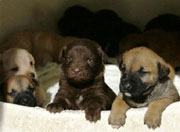|
 |
| A litter of 10 puppies peer
out of their cage, Dec. 13, 2005, at the Humane Society of South Mississippi in Gulfport,
Miss.. |
Puppies are popping up everywhere amid the rubble
left by Hurricane Katrina - and animal welfare workers on the northern
Gulf Coast fear it is only the start of a big boom in dog births.
Officials say more than 6,000 pets were saved after Katrina came ashore
Aug. 29, and many of them were relocated to homes elsewhere in the
country. An unknown number drowned in the floodwaters or died later of
injuries.
But thousands of animals remain, running loose in neighborhoods where
fences were flattened and many owners are gone.
"I've never seen so many puppies in my life," said Manny Maciel, an
animal control officer from New Bedford, Mass., who made two trips to help
trap loose dogs and cats in New Orleans and
Mississippi.
Earlier this month, Maciel pulled 10 puppies and their mother from
beneath a porch in a hard-hit section of Biloxi. He found seven puppies
and seven dogs during another shift.
Maciel took all the dogs to the Humane Society of South Mississippi,
where a shelter now holds about 250 dogs and cats, including nearly 50
puppies. The shelter is the largest one on the Mississippi coast.
Workers have yet to see a spike in cat births, but there's no doubt
about what dogs have been doing since the hurricane, said Tara High,
executive director of the nonprofit group.
"We're beginning to get litters now," High said. "It's a lot of
puppies, and it is not the puppy season."
Maciel and partner Janis Moore drive through mostly abandoned
neighborhoods checking reports of stray animals and encouraging pet owners
to have their animals spayed or neutered.
Some owners are hesitant to part with their pets for fear they'll never
see them again.
"A lot of times it's the only thing they've got," said Moore, who has
made three trapping trips .
Animals without owners often wind up at the shelter, where workers are
overwhelmed despite the trickle of volunteers who help walk dogs and clean up.
About 300 animals had to be euthanized in November at the shelter, High
said, but all were too old, sick or aggressive to be adopted. New owners
have adopted 378 other dogs and cats.
"It's frustrating," said High, who has worked every
day but Thanksgiving since Katrina. "The phone does not stop
ringing."
(Agencies) |
卡特里娜颶風(fēng)過(guò)后,碎石瓦礫間突然冒出了許多小狗崽,北部海灣的動(dòng)物保護(hù)義工們擔(dān)心一輪“狗崽潮”就要來(lái)臨。
據(jù)官方人員介紹,去年8月29日卡特里娜颶風(fēng)登陸后,有6000多只寵物獲救,大部分寵物被送往別處安了家。被洪水淹死及受傷后死去的寵物數(shù)量至今還不清楚。
但很多寵物還是活了下來(lái),它們無(wú)家可歸,在破爛不堪、人去樓空的街道上四處游蕩。
馬薩諸塞州新貝德福德動(dòng)物管理官員麥尼·馬舍爾說(shuō),我從來(lái)沒(méi)有見(jiàn)到過(guò)這么多小狗崽。麥尼之前去了新奧爾良和密西西比,就是為了捕捉那些無(wú)家可歸的小狗和小貓。
本月初,馬舍爾在比洛克西一個(gè)重災(zāi)區(qū)的門(mén)廊下發(fā)現(xiàn)了10只狗崽和它們的狗媽媽,并把它們救了回來(lái)。在他另一次當(dāng)班期間,他又發(fā)現(xiàn)了7只狗崽和7只狗。
馬舍爾把這些狗都送到了密西西比南部動(dòng)物保護(hù)協(xié)會(huì),這里的動(dòng)物收容所現(xiàn)在共收留了250只狗和貓,其中包括近50只狗崽。這是密西西比河沿岸最大的一家動(dòng)物收容所。
這個(gè)非盈利組織的執(zhí)行理事塔拉·哈伊說(shuō),我們這里的工人都見(jiàn)識(shí)過(guò)“貓崽潮”,但現(xiàn)在出現(xiàn)了"狗崽潮",這就不難猜測(cè)出卡里娜颶風(fēng)后,小狗們都做了些什么。
哈伊說(shuō),“我們現(xiàn)在已經(jīng)開(kāi)始收留狗崽了,雖然現(xiàn)在不是狗繁殖的季節(jié),但狗崽的數(shù)量很多。”
馬舍爾和他的同伴詹尼斯·摩爾開(kāi)車(chē)去了大多數(shù)的災(zāi)區(qū),搜救那些無(wú)家可歸的寵物,同時(shí),他們還說(shuō)服寵物的主人將寵物的卵巢切除或閹割。
有些寵物的主人不太愿意和寵物們分開(kāi),擔(dān)心以后再也見(jiàn)不到它們了。
摩爾說(shuō),“在很多時(shí)候,寵物就是他們的唯一。”為了搜捕寵物,摩爾已經(jīng)出了三次差。
沒(méi)有主人的寵物常常被收容所收留,盡管有一些志愿者來(lái)幫著遛狗和打掃衛(wèi)生,但是工人們的工作量還是很大。
哈伊說(shuō),去年11月,收容所中大約有300只寵物被安樂(lè)死,但這些被安樂(lè)死的動(dòng)物要么是老弱病殘,要么就是太兇狠。另有378只狗和貓被人領(lǐng)養(yǎng)。
哈伊說(shuō),“真是令人沮喪,電話鈴響個(gè)不停。”卡特里娜颶風(fēng)過(guò)后,哈伊每天都在工作,只在感恩節(jié)休息了一天。
(中國(guó)日?qǐng)?bào)網(wǎng)站編譯) |
